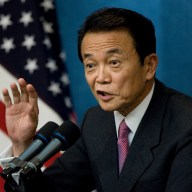 Mark Duplass, along with Elisabeth Moss, is one of two main cast members in “The One I Love.”
Mark Duplass, along with Elisabeth Moss, is one of two main cast members in “The One I Love.”
Credit: Getty Images
Mark Duplass is an old hat at improvisation; the films he stars in (“Humpday,” “Safety Not Guaranteed”) and his show “The League” often involve lots of adlibbing, as do the films he makes (“Cyrus,” “Jeff, Who Lives at Home”). With “The One I Love,” he was paired with someone who doesn’t have as much experience with it: Elisabeth Moss. Excepting a cameo from Ted Danson, they’re the only people onscreen. The two play a married couple who goes off to a remote getaway to repair their marriage — only to find that something very weird is happening. Not that he can talk about it, but he can talk about the film’s almost amusingly honest look at relationships.
It seems everyone’s trying to be strict about keeping a lid on the twist that happens in the first act.
I wouldn’t say it’s that strict, but we’ve definitely noticed the less people know about it the more they enjoy it. I assumed once we showed the movie at Sundance, the cat would be out of the bag and everyone would talk about it. But everyone’s been saying, “Oh I’m glad I didn’t know that until I saw the movie,” so we’re trying to retain that so audiences can see it the way we ideally want them to.
There are only three people in this movie, and one of them (Ted Danson) is only in the first scene. But you’re probably used to small casts.
It’s kind of how I made my career, just making little movies. It’s what I love doing the most. This one was definitely the smallest cast I’ve worked. You have to maintain interest in the film with only the two of us. It was fun, though. I’m into that, and I’m into how creative you can be within limits, and how limits can inspire things you wouldn’t normally think to do.
A lot of this was improvised. Moss doesn’t have much experience with that.
She hadn’t done much of it, but she was incredible right off the bat. I use a lot of improvisation in my work, and I find that most people who have a desire to do it and are good actors are going to be good at it. It’s not like comic improvisation — doing Uprights Citizens Brigade and being on your feet and telling jokes. [With dramas], you just need to inhabit your character and know where your scene is going. Then you’ll probably be really good at it.
 Mark Duplass plays a husband trying to reconnect with his wife (Elisabeth Moss) in “The One I Love.”
Mark Duplass plays a husband trying to reconnect with his wife (Elisabeth Moss) in “The One I Love.”
Credit: RADiUS-TWC
This is a pretty dark portrait of relationships.
The five main creative people leading the charge on this movie — myself, Lizzie, Charlie [McDowell, director], Justin [Lader, writer] and Mel [Eslyn, producer] — all of us have had a lot of relationship experience, and all of us are at extremely different points in our relationships. The one thing we had in common was that when you first start dating someone, you exposit this perfect version of yourself to them, to attract them to you. You talk about all the museums you go to, when you’re really just streaming “Housewives of Orange County” at home on Netflix. You talk about how you love to exercise and you take them to all the cool restaurants before you start admitting you love El Pollo Loco. How do you reconcile that person you’re eventually going to show to them, with all these flaws, with that perfect person that you exposited?
Eventually all your horrible qualities are going to come out.
They’re gonna come out. And then you have to ask, “Do you still like this person?” It’s an essential question I think about all the time. Do you want the beginning of the relationship, when things are so passionate and wonderful and exciting, but unknown? Or do you want 20 years into a marriage, when you are known — and hopefully loved — for all your faults and flaws? But the mystery is certainly gone. There’s a lot of work involved, and that’s hard too. So what’s the right thing? It’s hard to figure out.
Follow Matt Prigge on Twitter @mattprigge
















